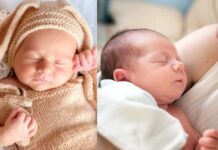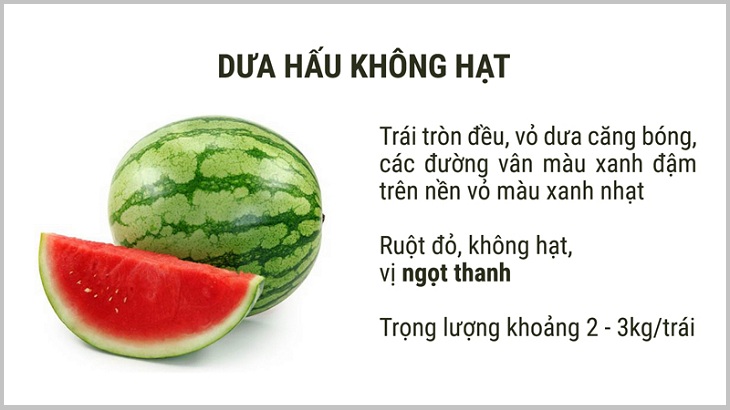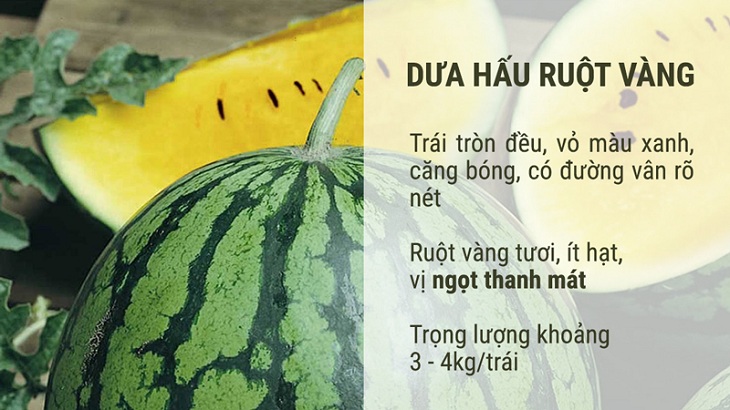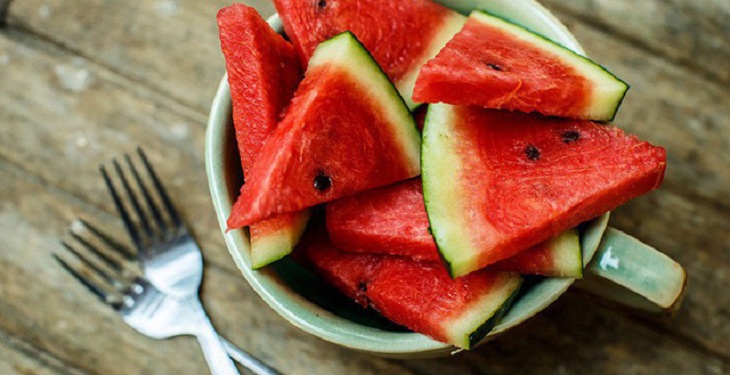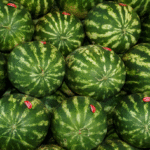Origin and Nutritional Composition of Watermelon
Origin
Watermelon is a fruit that originated from southern Africa. It belongs to the pumpkin family and has a hard rind and high water content. Watermelon is not only a refreshing fruit, but it also offers various health benefits such as anti-cancer properties, protection for the heart, and improvement of eye health.

In the market, watermelons come in different shapes and colors, with the most common variety having a light green color with vertical stripes. Watermelons can be elongated, oval, or round in shape.
Nutritional Composition
Watermelon has a cool and sweet taste. Here are the nutritional components found in 2/3 cup (100g) of watermelon:
- Calories: 30
- Water: 91%
- Protein: 0.6g
- Carbs: 7.6g
- Sugar: 6.2g
- Fiber: 0.4g
- Fat: 0.2g
Watermelon is also rich in vitamins such as vitamin A and vitamin C, as well as beneficial plant compounds like citrulline and lycopene.
Popular Types of Watermelon and How to Choose
Watermelon with Red Flesh

Seedless Watermelon
Watermelon with Yellow Flesh
Health Benefits of Eating Watermelon
Hydrating the Body
Watermelon contains about 92% water, making it an excellent hydrating fruit. Consuming watermelon or drinking watermelon juice is a great way to stay hydrated, especially during hot summer days.

Supplementing Vitamins and Minerals
Watermelon is rich in vitamins and minerals, particularly vitamin C, vitamin A, potassium, and magnesium. These nutrients are essential for maintaining overall health.

Preventing Cancer
Watermelon contains lycopene, a compound that has been associated with a reduced risk of certain types of cancers. Additionally, cucurbitacin E found in watermelon has shown potential in inhibiting the growth of cancer cells.
Cardiovascular Health Benefits
Watermelon is beneficial for heart health due to its content of vitamins A, B6, C, magnesium, potassium, and citrulline. These nutrients can help reduce blood pressure, lower cholesterol levels, and improve overall cardiovascular function.
Anti-Inflammatory Effects
Watermelon’s high antioxidant content, including lycopene and vitamin C, makes it effective in reducing inflammation in the body. Consuming watermelon or watermelon juice can help fight inflammation.
Eye Health Protection
Lycopene present in watermelon has antioxidant and anti-inflammatory properties that can protect the eyes from age-related macular degeneration.
Relieving Muscle Aches
The citrulline content in watermelon is known to help alleviate chronic muscle aches. Drinking watermelon juice or consuming watermelon after exercise can aid in muscle recovery.
Skin and Hair Care
Watermelon contains vitamins A, C, lycopene, and beta-carotene, which promote healthy skin and hair. These nutrients contribute to collagen production, skin cell regeneration, and protection against sunburn.
Improved Digestion
Watermelon’s fiber content aids in digestion, helping to prevent diarrhea and support the effective functioning of the digestive system.
Delicious Dishes Made from Watermelon
Watermelon Ice Cream
Watermelon ice cream is a refreshing and flavorful treat that perfectly complements the summer season. It is easy to make and can be enjoyed at home.
Watermelon Rind Preserves
Watermelon rind preserves are a unique and delicious snack. They have a beautiful green color, a soft texture, and a slightly sweet taste. This recipe is worth a try.

Watermelon Juice and Smoothie
Watermelon juice is not only tasty but also beneficial for the skin and maintaining a balanced body. You can enhance its flavor and nutritional value by combining it with other ingredients.

Watermelon Salad and Pickled Rind
A refreshing watermelon rind salad is a perfect summer dish. The crispy rind offers a pleasant sweet and sour taste.

Pickled watermelon rind is a unique and flavorful dish made from unexpected ingredients. The crunchy rind, combined with the sourness of rice vinegar and the spiciness of garlic and chili, makes a satisfying accompaniment to white rice.

References: hellobacsi.com, vinmec.com, and wikipedia














